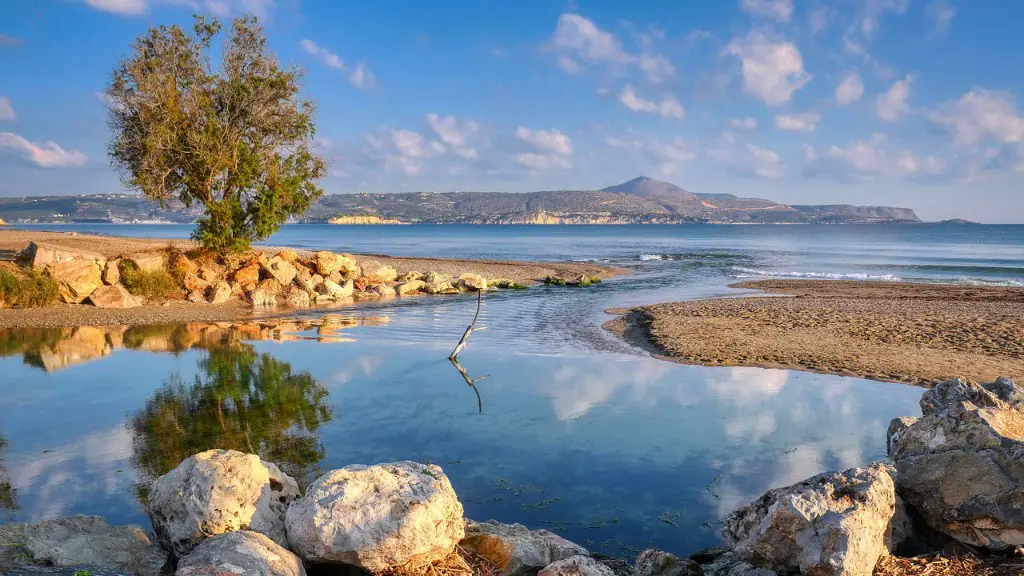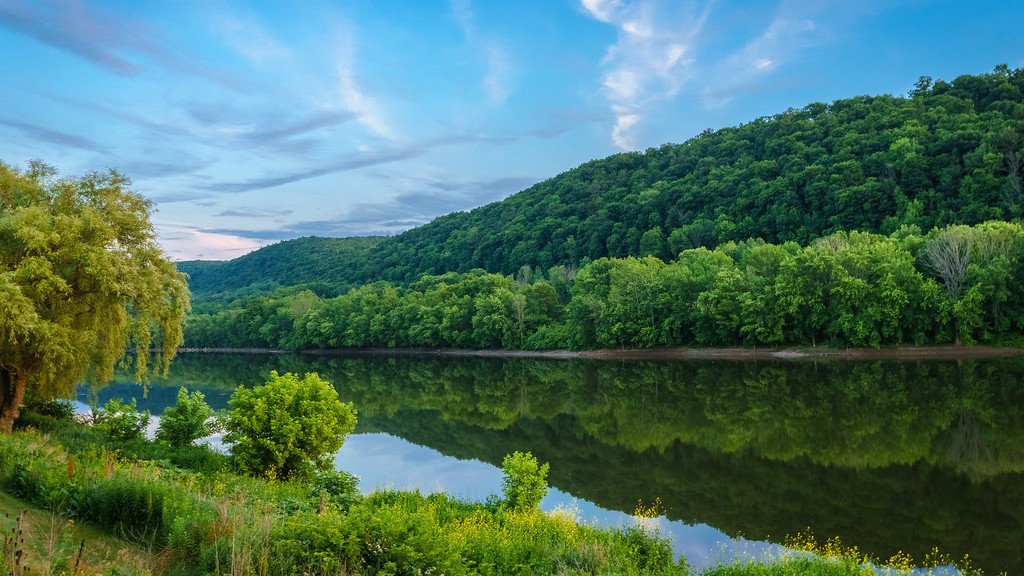Ancient Egyptian Religion and the Nile River
Egyptian civilization was one of the oldest and most lasting. Their religious beliefs and practices, including their polytheism, can be traced to origins dating as far back as 3100 BCE. They believed in an afterlife and the power of their gods. There were various gods helping with various tasks, such as gods that ruled the waters and the storms, as well as gods of war and of fertility. What is often left out when discussing Egyptian religion though, is the influence that the Nile River had on it.
The Nile River was revered in ancient Egypt for its importance for certain fundamental spiritual beliefs and patterns. Egyptians felt that the regular flooding of the river gave them a sense of assurance that the gods were governing their lives. The flooding also caused the floodplains on either side of the river to become productive, leading to a surplus of food. It is no surprise then, that the river was seen as a symbol of abundance, which ties into their belief in the afterlife.
The gods of the Nile River were believed to be deities of power, creation and fertility. As such, they were some of the figures most frequently depicted in Egyptian art. The yearly inundation of the river, which in the summer months reached its highest level, symbolized fertility and new life, which were integral aspects of ancient Egyptian religion. Not surprisingly, temples were often built on the Nile’s banks and Nile river gods were praised in hymns.
Apart from creating a favorable and easily maintained agricultural system, the Nile River also provided the Egyptians with many religious symbols and beliefs, including the notion of the cycle of life of death and rebirth. The river represented no less than a mystical stream of life, where one could go on to the afterlife after death. This cycle was believed to be a never-ending cycle of rebirth, which the Egyptians believed was a manifestation of the gods’ willingness to bestow eternity to those who stopped by them in the afterlife. This notion was also shared by other cultures, such as the ancient Sumerians who also believed in a cycle of death and rebirth.
The river also provided a connection between the living and the gods. The Egyptians often celebrated festivals related to the river and its gods, such as the feast of Khnum, or the feast of Hapy, the bulls of fertility. These feasts were held in order to honor the gods and keep their favor. A variety of offerings were also made to the gods, such as music, dances, agricultural produce, and even livestock.
The Nile River was an integral part of ancient Egyptian religion and culture. It was seen as a heavenly gift that could sustain and nourish the ancient Egyptians and their beliefs. This is why the river was often featured in religious ceremonies, offering a direct connection to the divine. The river was also deeply revered, with its gods being some of the most important figures in the ancient Egyptian pantheon.
Osiris and the River
The Egyptians believed in a cycle of death and rebirth, and they believed that the god Osiris was the gateway to this after life. Osiris was seen as the principal deity of the afterlife and the protector of the dead. He was also closely associated with the Nile River, with his death being associated with the flooding of the river. Death and rebirth were seen as a paradox, and Osiris was seen as the mediator between both.
According to ancient Egyptian mythology, Osiris’s death was made possible due to treachery from his own brother Seth. Yet, it was also seen as a necessary cycle for he was then reborn in a new form. This again ties into the cycle of death and rebirth, as the Nile River was seen as the vessel of life and the vehicle of resurrection. As such, Osiris was closely linked to the Nile since his death and rebirth were seen as a testament to the power of the river.
In addition to its connection with Osiris, the Nile River was seen as a place of purification and rebirth. It was believed that the soul of the dead was purified by its waters and was thus able to make the transition to the afterlife. This belief ties into the idea of the cycle of death and rebirth – the soul of the deceased must be cleansed so that it can be reborn in the afterlife.
The Nile River was also closely associated with the ancient Egyptian concept of ma’at. Ma’at was a spiritual concept that encompassed truth, justice, and divine order. It was believed that ma’at was established by the gods, and the Nile River was seen as a protector of this order. Thus, the river was seen as a link between the gods and humans, bringing divine order and balance to human life.
The Importance of the Nile
The Nile River had a profound effect on the ancient Egyptian religion. The connection between the Nile and the gods was clear and unbreakable, and the river was an integral part of the religious belief system of the Egyptians. It was believed that the divine power of the gods resided in the waters of the Nile, and the river was where the transcendence between life and death occurred.
What is also interesting is that the relationship between the god Osiris and the Nile had profound implications for the ancient Egyptians. He was seen as the god of death and rebirth and his death and resurrection were seen as a symbol of the divine power of the river. It can be said then, that the Nile River played a major role in shaping the religious beliefs and practices of the ancient Egyptians.
The King and the River
In ancient Egypt, the king was seen as the earthly embodiment of the gods. This is why it was believed that the king was blessed with divine power and authority. What is also important to note is that the king was closely associated with the Nile River. The king was seen as the protector and guardian of the river, and it was believed that he was the divine authority that allowed the Nile to continue to bring life to Egypt.
The king was also seen as a god in his own right, with his royal position being the symbol of the unity of Egypt and the gods. It was believed that the king was the medium through which the gods could communicate with the Egyptian people – and the Nile River was seen as a physical manifestation of this bond. As such, the king was expected to act as a mediator between the gods and his people, and his connection to the river was seen as yet another sign of his power and status.
Furthermore, ancient Egyptian religion also held the belief that the unified spiritual and physical realm of the king were manifestations of the divine. As such, the king was seen as the living embodiment of the gods and their power. His divine connection with the Nile River was yet another proof of his authority and power.
The Afterlife and the River
The afterlife was a major part of ancient Egyptian religion. The Egyptians believed that the soul of the deceased would be judged by the gods based on the deeds they had done in life, and they also believed that the deceased would have to pass various tests in order to reach the afterlife. The Nile River was an integral part of the afterlife journey, and the deceased were believed to traverse its waters in order to reach the afterlife.
The Egyptians believed that the waters of the Nile River could both cleanse and purify the dead. It was believed that in traversing the river, the deceased would be cleansed of all sins and be able to reach their destination in the afterlife. It was believed that the waters of the river were filled with the life-giving energy of the gods, and thus, the deceased were able to make the transition to the afterlife and be reborn in a new form.
The afterlife was also seen as a place of rebirth and renewal, and the Nile River was seen as a divine conduit to this realm. Thus, the Egyptians placed great emphasis on the powers of the river, believing that it held a special connection to the divine and could provide a gateway to the afterlife.
The Symbolism of the Nile
The Nile River was an important part of ancient Egyptian religion. Not only did it provide food and sustenance to the ancient Egyptians, but it was also seen as a symbol of divinity and a source of spiritual power. The waters of the Nile were believed to be connected to the gods, and the various festivals and offerings were made to the gods in order to secure their favor and keep the river bountiful.
In addition, the interaction between the god Osiris and the Nile was seen as a manifestation of the cycle of death and rebirth and a sign of the gods’ willingness to grant one everlasting life after death. The king was also seen as a divine manifestation of the gods, with his divine connection to the river being a testament to his power and authority. The afterlife was also seen as a place of spiritual renewal, and the Nile River was seen as a gateway to the afterlife.
In conclusion, it is clear that the Nile River was a fundamental part of ancient Egyptian religion. The river provided sustenance and was seen as a divine source of power, with its gods and festivals being celebrated and revered. The connection between the gods and the river was strong, and the symbolism of the river was deep and profound.
The Nile and Ancient Egyptian Society
Apart from its religious significance, the Nile River was also integral to ancient Egyptian society. The river provided the ancient Egyptians with a reliable source of water and a means of transportation and communication. In addition, the Nile was an important trading route, as goods were transported along its banks and exchanged for goods with different cultures.
The residents of ancient Egypt also relied on the river for sustenance and safety. The yearly flooding of the river provided life-giving water and the land surrounding it with fertility. The river was also the source of sustenance for wild and domestic animals, making it an important tool for survival. Furthermore, the river also provided the people of ancient Egypt with a sense of security and protection.
The importance of the Nile River to the ancient Egyptians cannot be overstated. The river provided not only material sustenance but also spiritual sustenance. It was a source of life-giving energy and a gateway to the divine. It was the structure that held the ancient civilization together, and its power and symbolism continues to be revered and celebrated to this day.
Mummification and the Nile
Mummification was an important ritual for the ancient Egyptians. In order to ensure their eternal life, the body had to be preserved after death for its journey to the afterlife. Mummification was seen as a form of protection for the spirit and a way to secure the soul’s journey to the afterlife.
The process of mummification was believed to be transferred to the body from the divine waters of the Nile River. It was believed that the waters of the river had special magical and spiritual properties that could preserve the body for the afterlife. Thus, the body was dried and then covered in a special oil believed to come from the river, which was believed to protect and preserve the body.
In addition, the ancient Egyptians believed that the Nile was the place where the soul would be able to traverse in order to reach the afterlife. Thus, the river was seen as a place of spiritual transit and rebirth. It was also believed that in traversing the river, the deceased would be purified and cleansed before being reborn in the afterlife.
Mummification was seen as one of the most important religious rituals for the ancient Egyptians. It was believed that the body had to be preserved so that the soul could make its journey to the afterlife. The Nile River was seen as a conduit to the afterlife and a source of spiritual protection. Thus, it was seen as an important element in ensuring the soul’s journey to the afterlife.
Conclusion:
The Nile River was deeply intertwined with the religious beliefs and practices of ancient Egypt. It was seen as a symbol of divinity and a source of life-giving energy. The river was also seen as a divine pathway to the afterlife, with its gods and rituals being revered and celebrated. The connection between the gods, the king, the afterlife, and the river was strong, and it was believed that the river held a special power that could provide spiritual protection and life-giving energy. In short, the Nile River was an essential part of ancient Egyptian religion.





